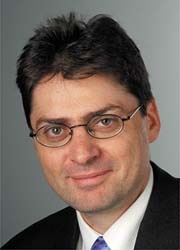Variations in urological residencies
The first step to discovering Europe's best training system
Urology is a surgical speciality with a limited number of consultants in Europe (around 134,000). The field is very well organised and active.

at the EAU Congress this March
At a European level, the EAU (European Association of Urology) and EBU (European Board of Urology) are the main senior urologists associations. In terms of residents and trainees in Urology, the ESRU is the sole European organisation fully dedicated to them.
One of the main ESRU objectives is to improve training for young urologists and contribute to the establishment of standards in training, to ensure that an optimal urological service can be offered to the European population.
One of the first steps to individualise the good points of training, is to be able to compare the actual situation of trainees between European countries. Hence, ESRU recently conducted a survey to compare urological residencies, helped by 496 trainees living in 30 European countries.
Their ages were 22–33 years (average: 28 years) when they began their residencies. Those in Western countries started later than in Eastern countries – especially Denmark, the United Kingdom and Ireland. The number of residents in each department was also very different from country to country, ranging from two to 15 with a mean of six, but there were no differences when comparing Eastern and Western Europe.
Residents had also been trained in a variable number of urological departments, ranging from 1–5 with a mean of 2.7. Many of them (83%) had also completed training in other specialities for a mean period of 21 months.
Residents from Western countries were more likely to have moved for training in another country, and the overall rate of residents who declared moves was 12%. Residents were globally satisfied with their working conditions (70%) and social status (78%), especially in Western countries, but this was associated with less satisfaction in non-professional activities for Western residents (52% vs. 64%). Eastern residents were less likely to be satisfied with salaries than Western residents (5% vs. 19%); the mean salary was also lower. The average hours trainees work in their departments was 67, with many variations (ranging from 24 to 160 hours). This is about 20 hours more than the European Union directives, which established that the maximum must be an average 48 hours weekly in a three-month period, for all doctors, including trainees.
Access to new surgical techniques was less often present in Eastern countries, with no laparoscopic procedures performed in the department of about half of Eastern trainees, compared with one third of Western residents. National courses are also organised in many countries in Europe, and more often in Eastern countries. Many European courses are now offered to residents (mainly with the help of the EAU), but only 43% of trainees had good understanding of English, with a better level in Western countries.
The last aspect of the study was to compare residents’ interest in research. Around 90% of them considered clinical research as essential, with no differences between Eastern and Western residents. Although, Eastern trainees were more interested in fundamental research than Western trainees (50% vs. 40%).
Globally, we observed that there were many differences from one country to another in Europe, but the impact on the training level is still poorly known. It is nonetheless likely that increasing the number of departments where residents are trained, and decreasing the number of residents in each department, might increase experience and hence the global level of trainees.
The EAU provides support for residents in urology to travel to another country to complete their training, which is very appreciated. The centres where residents are trained are also very important, and many differences also exist from one centre to another, within the same country. Hence, ESRU will continue its evaluations by focusing on centres more than countries, to highlight the aspect of the training that are the most efficient for increasing trainee levels in Europe.
Details: www.esru.net
08.03.2007




